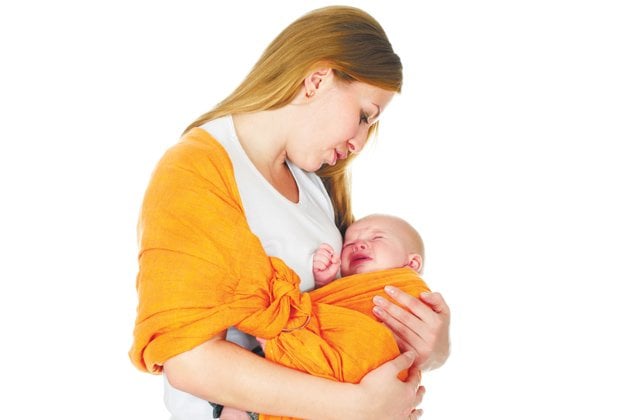
When you have a baby, everyone promises me, your whole world will be turned upside down. They say I’ll never sleep again and will be covered in poo and vomit for the next year. It’s gonna be awesome.
If all goes well, by the time you read this I’ll have a kid. Can I just say I’m sick of being pregnant? No booze, no food I like, and always, always worrying something’s going to go wrong. But here’s a fear I didn’t have until a pregnant friend confided her biggest anxiety: postpartum depression.
How can we protect ourselves against the blues that just won’t go away?
What the experts say
“The main cause of PPD is not getting the support a new mom needs in those first few months. Sleep is huge. Doctors will tell someone with PPD that she needs to get six to eight hours of [uninterruped] sleep. That’s possible if you get some help – volunteer, family or professional, like hiring a sleep doula. People who are anxious or who expect everything to be perfect, can find it very hard to cope when their lives are turned upside down. When you have a new baby you can’t predict what’s going to happen it’s not always going to be perfect.”
DEBBIE FAZIO
parenting coach, postpartum doula,
Toronto
“Toronto midwife Bridget Lynch did a study on women who don’t get postpartum depression and found that those in cultures that protect their mothers, nurture them after birth and allow them to rest for up to six weeks don’t get PPD. Those are communities where the grandmother is living with the family, or family is close by and can take over responsibilities. PPD often happens after the six-week mark or the three-month mark, when women [give themselves] this self-talk that they ought to be fine. I recommend fish oils, particularly EPA. Acupuncture is brilliant, and I prescribe herbs that are adrenal tonics. I’m not comfortable using some of the antidepressant herbs with breastfeeding. I like ashwagandha and eleutherococcus. These are perfectly safe.”
LISA DORAN
naturopath, co-editor, Joyful Birth: More Childbirth Stories Told By Doulas,
Ajax
“About 13 per cent of mothers will experience PPD within the first 12 weeks. If a mom is anxious or depressed during pregnancy and it goes untreated, that’s a risk factor, as is having significant life stressors and poor partner support. I recommend a mothers group. Bright light therapy is less commonly used but might be beneficial. There are a few little studies of acupuncture, but if you have severe depression that wouldn’t help though it could be an adjunct [to other treatment.] About 10 per cent of fathers will experience PPD in the first year, and the number-one risk factor is if they’ve had a previous depressive episode. If the mom’s depressed, that makes it harder for him.”
CINDY-LEE DENNIS
professor at Lawrence S. Bloomberg Faculty of Nursing,
University of Toronto
“If you’re talking about major depressive disorder, none of the natural or alternative treatments has been shown to be as robust as standard [pharmaceutical] medications. Typically, I would recommend exercise, omega-3 fatty acids and sometimes massage, acupuncture or light therapy. The one caveat is that if someone has an underlying bipolar disorder, light therapy can rev her up too much. Typically, light therapy involves a 10,000-lux light box, and individuals need to use it about 30 minutes a day in the morning. Acupuncture hasn’t shown consistent benefit for depression. With supplements and nutraceudicals we don’t want to assume something is safer in pregnancy [or while breastfeeding] because it’s natural.”
MARLENE FREEMAN
director of clinical services, perinatal and reproductive psychiatry group,
Massachusetts General Hospital, Boston
“Some women’s brains may be more sensitive to hormonal changes than others’. Other risk factors for PPD are childhood or recent trauma, the death of a parent, domestic violence, financial stress. Most specialists recommend medication and/or therapy. Baby blues is a normal hormonal adjustment that goes away after two weeks. There’s nothing wrong with crying and having mood swings. PPD occurs when the two weeks are over and things are getting worse. Long-term untreated PPD and anxiety have a negative effect on a baby’s cognitive and behavioural development.”
KATHERINE STONE
publisher, postpartumprogress.com,
Atlanta
Got a question?
Send your Althealth queries to althealth@nowtoronto.com












